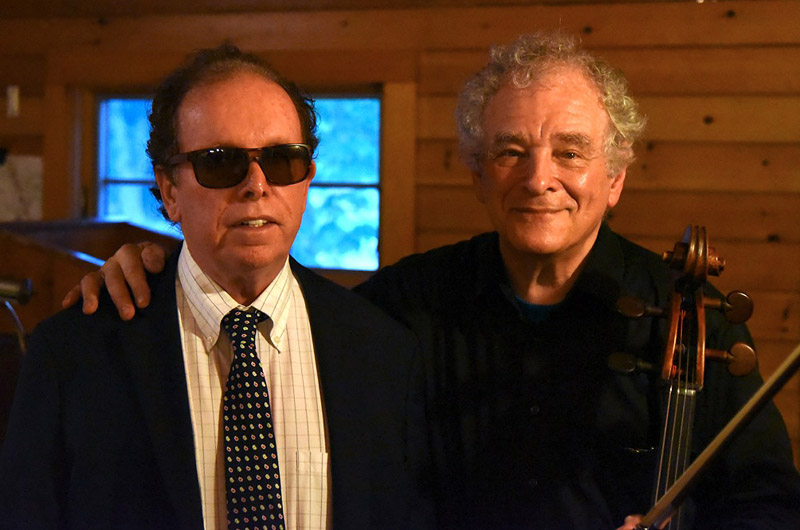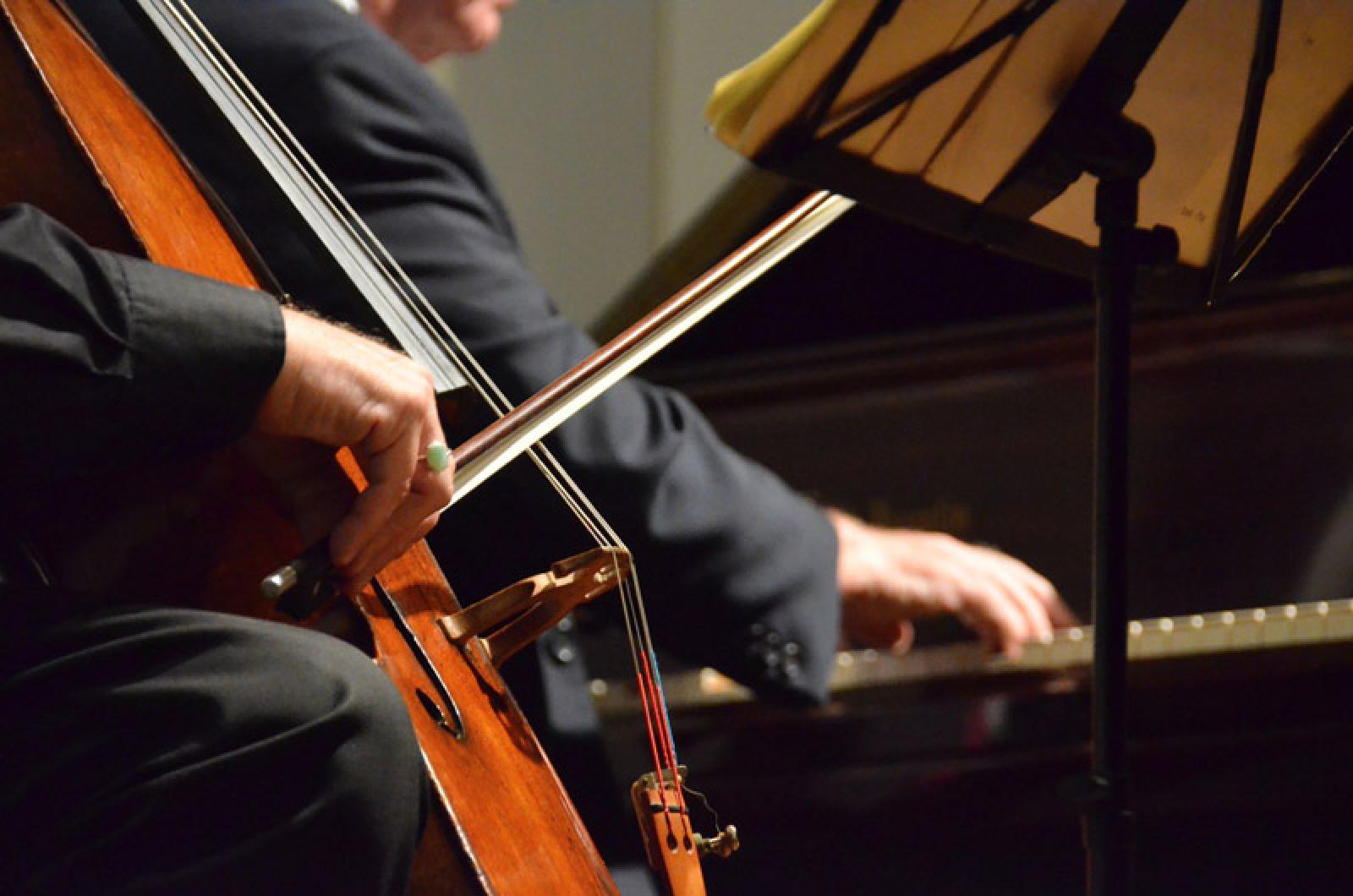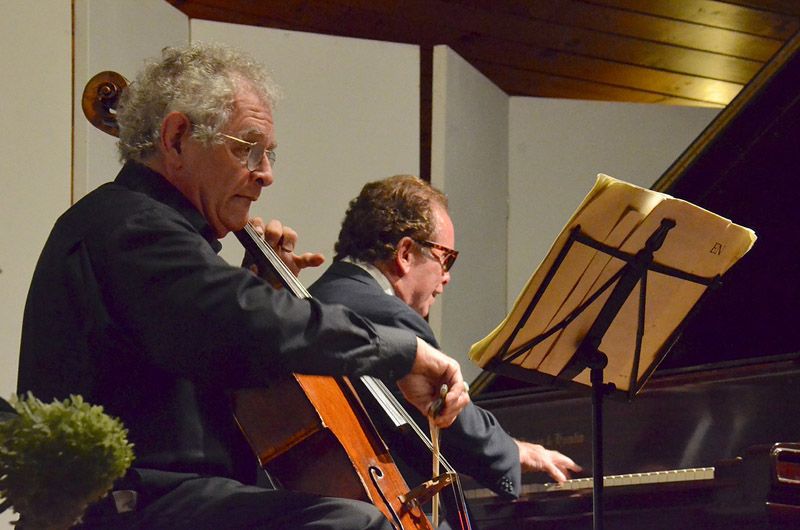Pianist David Crohan has been entertaining Island audiences for more than half a century. It was in 1964 that he first played the Tabernacle, where he returned last month for a birthday concert showcasing patriotic tunes. His 20 years (1978-1997) at the helm and keyboard of David’s Island House on Circuit Avenue made Mr. Crohan, 72, a beloved institution among music-loving Vineyarders and visitors.
His trademark sound is an engaging mix of 20th-century jazz and pop standards, performed with classically-trained technique and a deep sense of swing. Superstar Billy Joel (the other Piano Man) was so impressed with Mr. Crohan’s playing at a Palm Beach club in 2014 that he asked to sit in for a duet of Fats Waller’s Ain’t Misbehavin’.
Sunday night at the Chilmark Community Center, an intimate audience of about 50 listeners heard a very different side of Mr. Crohan in an evening of music by Beethoven and Brahms, both solo and with cellist Joel Krosnick.
Mr. Crohan told the attentive group that playing with Mr. Krosnick, a longtime member of the Grammy-winning Juilliard String Quartet,
is “like being a Beatles fan and being offered a chance to do a concert with Paul McCartney.”
For his part, Mr. Krosnick said: “Partnerships are very special in music. They are not made, they happen.”
The two musicians met last year and “loved playing together,” he continued.
Their concert, held to benefit Island Elderly Housing and WMVY, was, “truly one of the highlights of my life,” Mr. Crohan said. “It’s something that I rarely do now, uncompromising classical music.
“I have three degrees in classical music, but it’s not how I make my living,” continued Mr. Crohan, an alumnus of the New England Conservatory of Music and Perkins School for the Blind. “Next concert, I’ll do Friends In Low Places,” he jokingly promised.

Mr. Crohan began the program with a solo performance of Beethoven’s Piano Sonata No. 27, Op. 90, composed in 1814. Introducing the work, Mr. Crohan noted that the composer was still struggling to adjust to his deafness and that some of his torment could be heard in the early movements. Yet, by the end, the sonata is “one of the most peaceful, serene, accepting pieces he ever wrote,” Mr. Crohan said.
Mr. Krosnick then joined Mr. Crohan on the Chilmark Community Center stage for Beethoven’s Cello Sonata No. 3, Op. 69 (1808).
“This is one of the first sonatas of any kind where the instruments are equal in task and importance,” Mr. Krosnick told the audience, calling the piece “unbelievably generous in spirit.”
Turning to Brahms, Mr. Crohan played the composer’s last solo piano work, Four Pieces for Piano, before welcoming Mr. Krosnick back to the stage for what the cellist called the “very dark, yet very warm” Cello Sonata Op. 38 in E Minor.
Mr. Crohan then left the 19th century for the 20th, duetting with Mr. Krosnick on George Gershwin’s Our Love is Here to Stay. The two began in standard pop-classical form, with Mr. Krosnick lyrically bowing the melody over Mr. Crohan’s chords. Then the pianist’s left hand strode into action with a walking bass and his right hand began to flourish across the upper keys as a perceptible thrill of recognition rippled through the audience: This was the David Crohan of David’s Island House and the Tabernacle concerts, whose 10 fingers can rival an entire band.
Mr. Crohan had one more surprise for his listeners, a solo performance — complete with vocal — of the Harold Arlen-Johnny Mercer ballad This Will Be My Shining Hour. He dedicated it to his wife, Claudette Cartier Crohan, but included the couple’s extended family (and perhaps the audience as well) as he added a message to the final chorus: “This will be my shining hour, till — next year, I hope — we’re all together again.”





Comments
Comment policy »